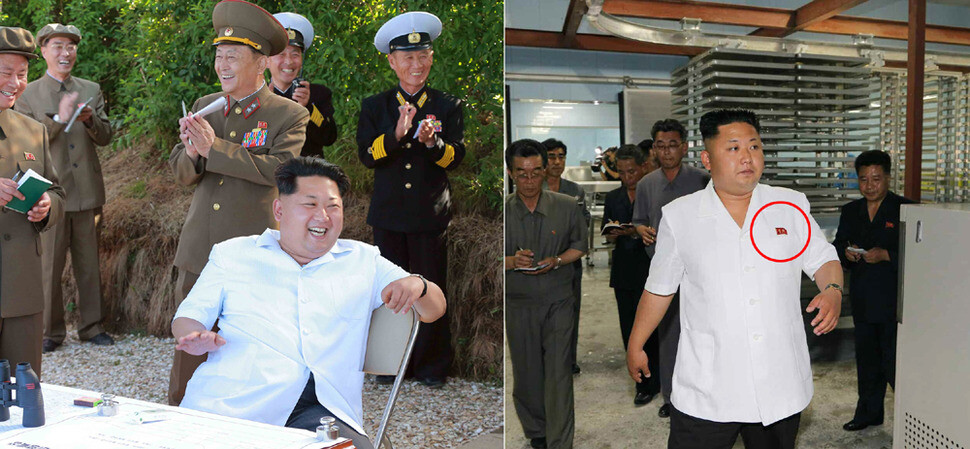hankyoreh
Links to other country sites 다른 나라 사이트 링크
Refugee testimony hints at slight improvement in North Korean prisons

Facing criticism from the international community, North Korea has been cutting down on cruel treatment in its prisons, some North Korean refugees said.
According to the White Paper on Human Rights in North Korea 2015 based on in-depth interviews with 221 North Korean refugees, which the Korea Institute for National Unification (KINU) released on July 1, torture, beatings, and other human rights abuses taking place inside North Korea’s prisons and other detention facilities remain severe. But there was also testimony suggesting that North Korea had made some effort to correct human rights abuses inside prisons in response to criticism from the outside world.
“After the reality of human rights abuses inside the prisons came to the attention of the wider world by way of released prisoners, there have been active efforts to prevent fatalities in the prisons,” said a North Korean refugee who was at the Jongo Village Prison in Hoeryong, North Hamgyong Province, from April 2010 to Jan. 2013.
The total number of people who have been publically executed in North Korea between 2000 and 2014 is estimated to be 1,382, according to interviews with North Korean refugees between 2008 and 2014. From 2008 to 2014, this number has been on the decline: 161, 160, 106, 131, 21, 82, and 5.
KINU explained that, since these figures are updated every year according to the testimony of interviewed refugees, it is not conclusive evidence that the number of public executions in North Korea dropped to 5 last year. If refugees who are interviewed in subsequent years say they witnessed public executions in 2014, these will be added to the figure for that year.
The white paper reported that there were examples of large numbers of defendants charged with the same crimes being tried publically, with some of them executed and the rest found not guilty and let go because of “Kim Jong-un’s consideration and guidance.”
One refugee also testified that a neighbor had been released from a political prison camp as a result of Kim Jong-un’s principle that mercy can be shown for someone who is 99% in error and only 1% in the right.
“This seems designed to present Kim Jong-un as a leader who loves his people. The very fact that such measures are possible shows that Kim’s guidelines and directions wield a power that supersedes the law,” the institute said.
In regard to the right to food, refugees testified that, while rations improved temporarily after 2012 after the government tapped into the army’s rice reserves, differences in economic power lead to serious inequality in access to food.
KINU’s Center for North Korean Human Rights prepared the white paper in accordance with in-depth interviews that it conducted with 221 of the 1,396 defectors who entered South Korea in 2014 in consideration of their social background and demographic characteristics. KINU has been publishing the white paper in Korean and English each year since 1996.
By Kim Ji-hoon, staff reporter
Please direct questions or comments to [english@hani.co.kr]

Editorial・opinion
![[Column] Park Geun-hye déjà vu in Yoon Suk-yeol [Column] Park Geun-hye déjà vu in Yoon Suk-yeol](https://flexible.img.hani.co.kr/flexible/normal/500/300/imgdb/original/2024/0424/651713945113788.jpg) [Column] Park Geun-hye déjà vu in Yoon Suk-yeol
[Column] Park Geun-hye déjà vu in Yoon Suk-yeol![[Editorial] New weight of N. Korea’s nuclear threats makes dialogue all the more urgent [Editorial] New weight of N. Korea’s nuclear threats makes dialogue all the more urgent](https://flexible.img.hani.co.kr/flexible/normal/500/300/imgdb/original/2024/0424/7317139454662664.jpg) [Editorial] New weight of N. Korea’s nuclear threats makes dialogue all the more urgent
[Editorial] New weight of N. Korea’s nuclear threats makes dialogue all the more urgent- [Guest essay] The real reason Korea’s new right wants to dub Rhee a founding father
- [Column] ‘Choson’: Is it time we start referring to N. Korea in its own terms?
- [Editorial] Japan’s rewriting of history with Korea has gone too far
- [Column] The president’s questionable capacity for dialogue
- [Column] Are chaebol firms just pizza pies for families to divvy up as they please?
- [Column] Has Korea, too, crossed the Rubicon on China?
- [Correspondent’s column] In Japan’s alliance with US, echoes of its past alliances with UK
- [Editorial] Does Yoon think the Korean public is wrong?
Most viewed articles
- 1‘We must say no’: Seoul defense chief on Korean, USFK involvement in hypothetical Taiwan crisis
- 2N. Korean delegation’s trip to Iran shows how Pyongyang is leveraging ties with Moscow
- 3‘Weddingflation’ breaks the bank for Korean couples-to-be
- 4[Reportage] On US campuses, student risk arrest as they call for divestment from Israel
- 5Amnesty notes ‘erosion’ of freedom of expression in Korea in annual human rights report
- 6[Column] Park Geun-hye déjà vu in Yoon Suk-yeol
- 7Korea sees more deaths than births for 52nd consecutive month in February
- 8[Editorial] New weight of N. Korea’s nuclear threats makes dialogue all the more urgent
- 9Will NewJeans end up collateral damage in internal feud at K-pop juggernaut Hybe?
- 10[Guest essay] The real reason Korea’s new right wants to dub Rhee a founding father